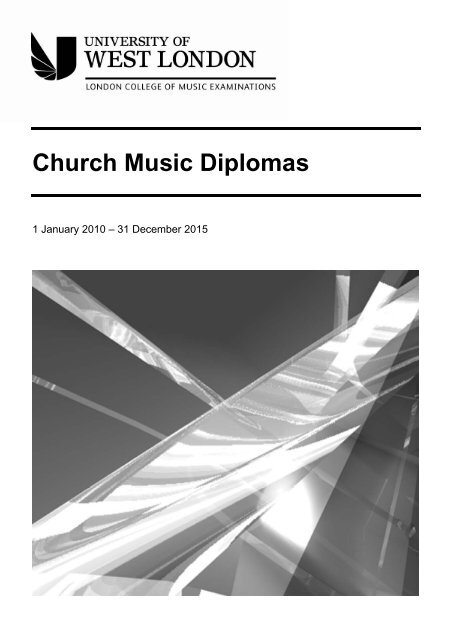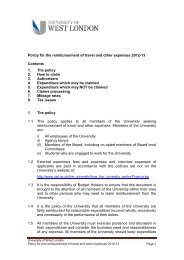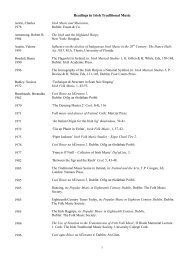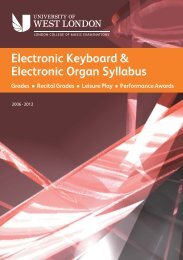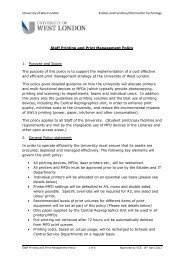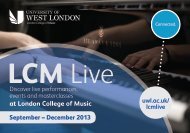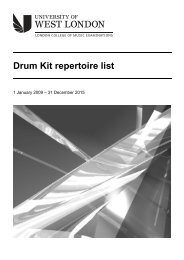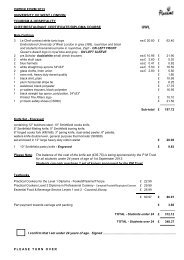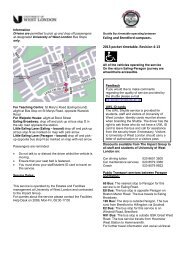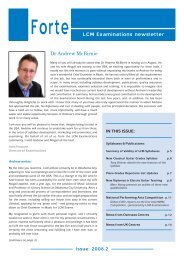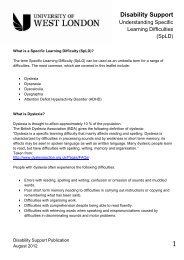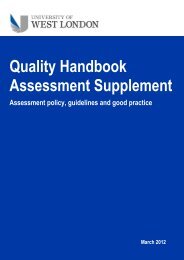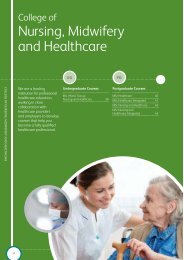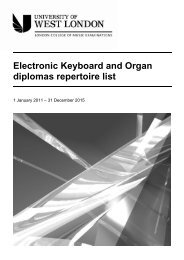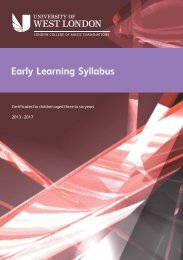LCM Exams - Church Music Diplomas - University of West London
LCM Exams - Church Music Diplomas - University of West London
LCM Exams - Church Music Diplomas - University of West London
- No tags were found...
Create successful ePaper yourself
Turn your PDF publications into a flip-book with our unique Google optimized e-Paper software.
<strong>Church</strong> <strong>Music</strong> <strong>Diplomas</strong>1 January 2010 – 31 December 2015
Syllabus for<strong>Diplomas</strong> in <strong>Church</strong> <strong>Music</strong>Dip<strong>LCM</strong>, A<strong>LCM</strong> and L<strong>LCM</strong>2010 - 2015
<strong>LCM</strong> ExaminationsDirector <strong>of</strong> ExaminationsJohn Howard BA PhDChief Examiner in <strong>Music</strong>Philip Aldred BEd F<strong>LCM</strong><strong>University</strong> <strong>of</strong> <strong>West</strong> <strong>London</strong><strong>LCM</strong> ExaminationsSt Mary’s RoadEaling<strong>London</strong>W5 5RFtel: +44 (0)20 8231 2364fax: +44 (0)20 8231 2433email: lcm.exams@uwl.ac.ukuwl.ac.uk/lcmexams© Copyright 2011 by the <strong>University</strong> <strong>of</strong> <strong>West</strong> <strong>London</strong>, <strong>LCM</strong> Examinations2
ContentsPage<strong>London</strong> College <strong>of</strong> <strong>Music</strong> Examiners .................................................................... 4<strong>London</strong> College <strong>of</strong> <strong>Music</strong> / <strong>London</strong> College <strong>of</strong> <strong>Music</strong> Examinations ....................... 51. Syllabus Introduction1.1 Overview <strong>of</strong> the <strong>LCM</strong> <strong>Church</strong> <strong>Music</strong> Diploma Structure ...................... 61.2 Validity <strong>of</strong> this Syllabus ..................................................................... 71.3 Rationale .......................................................................................... 71.4 Syllabus Aims ................................................................................... 71.5 Syllabus Objectives ........................................................................... 71.6 Availability <strong>of</strong> Examinations and Entry Details .................................... 81.7 Duration <strong>of</strong> Examinations .................................................................. 81.8 Target Groups .................................................................................. 81.9 Candidates with Particular Needs ...................................................... 81.10 <strong>LCM</strong> Publications .............................................................................. 81.11 Progression ...................................................................................... 92. Syllabus Content2.1 Syllabus Overview ............................................................................. 102.2 Attainment Levels ............................................................................. 102.3 Pre-requisite Qualifications ............................................................... 112.4 Summary <strong>of</strong> Subject Content ............................................................ 122.5 Guidelines for Performance Component ............................................ 142.6 Guidelines for Rehearsal Techniques Component ............................... 152.7 Description <strong>of</strong> Examination Components ........................................... 162.8 Mark Weightings for Examination Components ................................. 223. Assessment3.1 How Marks are Awarded ................................................................... 233.2 Attainment Descriptions ................................................................... 274. Awarding and Reporting4.1 Issue <strong>of</strong> Results ................................................................................ 284.2 Awards ............................................................................................. 284.3 Repeats <strong>of</strong> Examinations .................................................................. 285. Regulations and Information .......................................................... 293
<strong>London</strong> College <strong>of</strong> <strong>Music</strong> ExaminersAchini Abeygunawardene F<strong>LCM</strong> FVCM LTCL ALAMPhilip Aldred BEd F<strong>LCM</strong> [Chief Examiner in <strong>Music</strong>]William Alexander BSc BMus MBA MMus PhD GRIC FTCL ARCM ATCLCertFAE *Helen ArthurMarie Barry BA F<strong>LCM</strong> ALSM ALAMDavid Beer BA PGCE F<strong>LCM</strong>John Beilby BMus PhD MTC(Lond) G<strong>LCM</strong> F<strong>LCM</strong> LRAM LTCL HonFIEMS †Erica Beynon MA F<strong>LCM</strong> L<strong>LCM</strong> A<strong>LCM</strong>John Branton FVCM LVCM(TD) AMusVCM CT(VCM) ATM(SMTC) HonVCMClaire Brock BA GradDipJoshua Brown BA LTCL PGCEKeith Brown BMus A<strong>LCM</strong> PGCECatherine Burnham BMus LTCL PGCEDorothy Carnegie BMus PGCEPaul Carter BMus MA DASM A<strong>LCM</strong> PGCE FRSARebecca Chambers GRNCM PGRNCMAlice Chua MA F<strong>LCM</strong> ATCLGerald Collins L<strong>LCM</strong>(TD)Justin Connolly BMus ARCM F<strong>LCM</strong>Peter Cook G<strong>LCM</strong> F<strong>LCM</strong> FVCM PGCE *Stuart Corbett BA FDipMus FVCM(Hons) LTCL L<strong>LCM</strong> PGCE *Jamie Cordell BMus PGDipHannah Cott BMusBarbara Courtney-King LRAM ARCMSandra Cromie BA L<strong>LCM</strong>(TD) A<strong>LCM</strong> PGCEPatrick Davey BMus MA TTCTKatherine Denton BMus LRAM DipABRSMJanet Dowsett F<strong>LCM</strong> *Barry Draycott MusB FTCL F<strong>LCM</strong> ARCM ARCO Hon<strong>LCM</strong> *David Edwards BEd LGSMJennifer Fisher DipRAM LRAM BMus GSMDSheila Gaskell FTCL LRAM L<strong>LCM</strong>Aidan Geary G<strong>LCM</strong>Kathleen Gilbert LRAM ARCM DipEdKevin Gill FRCO GBSM LTCLCoral Gould LRAM ARCM LTCL CertEdMoira Gray F<strong>LCM</strong> LRAM LTCL ARCM DipMus(Open)Yolande Gregor-Smith LRSM ARCM DipTESOLAnn Griggs BA MA LRAM ARCM Hon<strong>LCM</strong>Nigel Groome G<strong>LCM</strong> ARSCM F<strong>LCM</strong> *Peter Hallam BEd MA LTCLMary Hamilton GTCL LTCL Dip.Acad.di Sta.Cecilia RomeMary Hardy-Green L<strong>LCM</strong>Paul Harrison MA G<strong>LCM</strong> F<strong>LCM</strong> L<strong>LCM</strong>(TD) LTCL PGCEAndrew Hatt BA Hon<strong>LCM</strong>Stephen Hazell BA PhD [Chief Examiner in Drama and Communication]Sheila Hemming L<strong>LCM</strong> ARCM Hon<strong>LCM</strong>Ann Hohenkerk A<strong>LCM</strong>John Howard BA PhD [Director <strong>of</strong> Examinations]Vic HylandDeborah Jones BA DipMus A<strong>LCM</strong>Daithi Kearney BA HDipEd TTCT PhDChris Kimber GGSMRichard Lambert BEd MA A<strong>LCM</strong> FRSA *Elizabeth Lannigan A<strong>LCM</strong>Tara Leiper BEd MA LTCL L<strong>LCM</strong>(TD) ARCM DipABRSMJayne Lewis BA PGCEJayne Lindgren LLAM †Jocelyn Lord MA F<strong>LCM</strong> LGSM LLAM ACSD †Helen Madden GC<strong>LCM</strong>Susan Maguire BA HDipEd DipItal L<strong>LCM</strong>(TD) A<strong>LCM</strong> EFLCertAndrew McBirnie BA MMus PhD LTCL *Ray McGinley A<strong>LCM</strong>Paula McKernan LLB A<strong>LCM</strong>(TD)Andrew McManus BMus GBSM F<strong>LCM</strong> ABSM(TD) ACertCM TEFL(Dip)Neil Millensted MA FTCL LRAM ARCMMichael Milner LGSM A<strong>LCM</strong>John MitchellJoyce Mitchell F<strong>LCM</strong> L<strong>LCM</strong> A<strong>LCM</strong>Susan Olden LRAM L<strong>LCM</strong>(TD) ARCM AMusTCLAtes Orga BMus FTCL LMusTCL ATCLGillian Patch MusB MMus PGDip L<strong>LCM</strong> LTCL LGSM HonF<strong>LCM</strong> *Christine Peet BA MEd CertEdTony Pegler F<strong>LCM</strong>Maxwell Pettitt BMus MMus ARCM A<strong>LCM</strong> FRSAKathleen Phillips LGSM A<strong>LCM</strong>Elizabeth Pipe F<strong>LCM</strong>Peter Precious GradDipMusJenifer Pressdee LGSM ANEANigel Ramage MA DipEd †Peter Reder MA G<strong>LCM</strong> ACSD †Michael Regan BMus MMus LGSM HonF<strong>LCM</strong>Nathan Rose BMus PGDip A<strong>LCM</strong>Claire Rubman PhD F<strong>LCM</strong> L<strong>LCM</strong>(TD)Gibson Russell GRSM LRAM ARCM HonF<strong>LCM</strong>Rex Satchwell BA LGSM LRAM HonF<strong>LCM</strong>Ian Seddon F<strong>LCM</strong> ATCL ARCOGillian Shimwell AGSM CertEdDave Simpson LGSMTony Skinner FRSAElaine Smith G<strong>LCM</strong> L<strong>LCM</strong> HonF<strong>LCM</strong> *Alison Sparrow BAJennifer Speculand F<strong>LCM</strong> FSTD L<strong>LCM</strong>(TD) LGSM ALAM †Christopher Stanbury BMus MMus F<strong>LCM</strong>Christopher Tinker PhD GRSM ARCM PGCEJ Godfrey Turner F<strong>LCM</strong> LTCL LRAM ARCM MCollPLeo Turner LTCL L<strong>LCM</strong> LGSMChristopher Tutin BMus MA LRSM A<strong>LCM</strong> CertRCOMichael Venables BA PGCEJill Wallis BEd F<strong>LCM</strong> LTCLRichard Walsh BA MPhil F<strong>LCM</strong>John Warren BMus GMus F<strong>LCM</strong> LGSM LTCL ACertCM CertEdTonni Wei LMusVCM ARCMDavid Whittaker G<strong>LCM</strong> F<strong>LCM</strong> L<strong>LCM</strong>(TD) *Martyn Williams BMus GRSM FRCO F<strong>LCM</strong> MTC PGCE HonF<strong>LCM</strong> *Peter J Williams G<strong>LCM</strong> MBA F<strong>LCM</strong> L<strong>LCM</strong>(TD) NPQHWei Wong G<strong>LCM</strong> L<strong>LCM</strong>(TD) PGCE Hon<strong>LCM</strong>Carol Woods MA GRSM ARMCM* denotes Senior Examiner in <strong>Music</strong> † denotes Senior Examiner in Drama and Communication[This list was correct at the time <strong>of</strong> printing.]4
<strong>London</strong> College <strong>of</strong> <strong>Music</strong>The <strong>London</strong> College <strong>of</strong> <strong>Music</strong> (<strong>LCM</strong>) is one <strong>of</strong> the largest specialist <strong>Music</strong> and Performing Arts institutes in theUK. It has a long history <strong>of</strong> music education dating back to 1887, when it was situated in Great MarlboroughStreet, <strong>London</strong>, where the college began as an examination body. In 1991 <strong>LCM</strong> became part <strong>of</strong> Thames Valley<strong>University</strong>, which was renamed the <strong>University</strong> <strong>of</strong> <strong>West</strong> <strong>London</strong> in 2011.The <strong>London</strong> College <strong>of</strong> <strong>Music</strong> <strong>of</strong>fers an impressive range <strong>of</strong> innovative courses, respected worldwide anddelivered with creativity and passion by practising industry experts. Courses include Performance andComposition, Popular <strong>Music</strong> Performance and Recording, Performing Arts, <strong>Music</strong> Management, <strong>Music</strong>Technology and Theatre Production.Further information about full-time programmes for undergraduate and postgraduate students, in addition tothe Junior College, is available from:• the UWL Learning Advice Centre - tel: 020 8579 5000; email: learning.advice@uwl.ac.uk• the Faculty <strong>of</strong> the Arts <strong>of</strong>fice - tel: 020 8231 2304; email: music@uwl.ac.uk• www.uwl.ac.uk/music<strong>London</strong> College <strong>of</strong> <strong>Music</strong> ExaminationsExternal examinations have been awarded by the <strong>London</strong> College <strong>of</strong> <strong>Music</strong> since the institution’s founding in1887. Today, examinations are held throughout the United Kingdom, Republic <strong>of</strong> Ireland and at many overseascentres, and are unique in the graded examinations world in being awarded by a university.<strong>LCM</strong>’s graded and diploma examinations in most subjects are accredited by Ofqual (formerly the Qualificationsand Curriculum Authority, QCA), which serves as a UK governmental stamp <strong>of</strong> approval and quality assurance,confirming parity <strong>of</strong> standards with other similar examinations boards. Furthermore, the resulting mapping <strong>of</strong><strong>LCM</strong> Examinations onto the QCF (Qualifications and Credit Framework) means that candidates applying to UKuniversities through the UCAS system can increase their points tariff if they have been awarded a Pass or higherat Grades 6-8 in an accredited subject.<strong>LCM</strong> Examinations are distinctive, both in the qualifications <strong>of</strong>fered and in the administration and running <strong>of</strong> theexams. We have retained the well-known traditional atmosphere and qualities <strong>of</strong> the <strong>London</strong> College <strong>of</strong> <strong>Music</strong>:informality, friendliness and approachability, although set in a fully pr<strong>of</strong>essional and modern context. We aresmall enough that enquiries to the head <strong>of</strong>fice can be dealt with speedily and efficiently, and we are able to getto know many <strong>of</strong> our representatives and teachers personally by name. Examiners pride themselves on beingfriendly and approachable, ensuring candidates are put at their ease and are thus able to perform to their fullpotential; yet they are pr<strong>of</strong>essional, applying thorough and objective assessment criteria in forming theirjudgements.Our range <strong>of</strong> syllabuses and exam formats is exceptionally wide. Examinations may be taken in piano, allorchestral instruments, classical singing, music theatre, popular music vocals, guitar, electronic keyboard,electronic organ, drum kit, percussion, church music, Irish and Scottish traditional music, jazz (piano, wind andbrass), ensemble, early learning, theory (both classical and popular) and composition. Examinations in acoustic,electric and bass guitars are <strong>of</strong>fered in partnership with the Registry <strong>of</strong> Guitar Tutors (RGT). Our diplomas areinternationally recognised and include composition, conducting, thesis and theoretical diplomas as well asperforming and teaching diplomas in all instruments, across four levels.We <strong>of</strong>fer a number <strong>of</strong> pre-Grade 1 Step exams. Graded exams include a viva voce element, which encouragescandidates to think, both technically and critically, about the music they perform in the exam. Syllabusescontain a wide range <strong>of</strong> repertoire options, sometimes including an own choice element. Finally, we <strong>of</strong>fer thevery popular Leisure Play option, where candidates perform three pieces plus a fourth own choice, but do notattempt any <strong>of</strong> the additional components <strong>of</strong> the exam.Graded and diploma syllabuses are available free <strong>of</strong> charge via our website uwl.ac.uk/lcmexams or on requestfrom <strong>LCM</strong> Examinations and from local representatives.5
1. Syllabus Introduction1.1 Overview <strong>of</strong> the <strong>LCM</strong> <strong>Church</strong> <strong>Music</strong> DiplomaStructureGrade 5 TheoryDip<strong>LCM</strong> in<strong>Church</strong> <strong>Music</strong>1. Solo Performance2. Viva Voce3. Sight ReadingDipMus<strong>LCM</strong>Theoretical DiplomaA<strong>LCM</strong> in <strong>Church</strong> <strong>Music</strong>(Option 1)1. Solo Performance2. Rehearsal Techniques3. Viva Voce4. Sight Reading5. Aural TestsA<strong>LCM</strong> in <strong>Church</strong> <strong>Music</strong>(Option 2)1. Solo Performance2. Rehearsal Techniques3. Viva VoceL<strong>LCM</strong> in <strong>Church</strong> <strong>Music</strong>1. Solo Performance2. Rehearsal Techniques3. Sight Reading4. Essay OR Arranging5. Viva VoceF<strong>LCM</strong> in Performance,Composition or Thesis *(Refer to relevant syllabus)* There is no F<strong>LCM</strong> specifically in <strong>Church</strong> <strong>Music</strong>. Instead, candidates are invited to enter for F<strong>LCM</strong> inPerformance, Composition or Thesis as appropriate. Composition folios may consist either wholly or inpart <strong>of</strong> music intended for use in worship, and subjects related to church music are acceptable for thesissubmissions. In addition, performing editions <strong>of</strong> music for church use are also acceptable by prioragreement.For more information, please see the relevant syllabuses or contact the Chief Examiner in <strong>Music</strong>.6
1.2 Validity <strong>of</strong> this SyllabusThis syllabus is valid from 1 January 2010 until 31 December 2015.1.3 Rationale<strong>LCM</strong>’s graded and diploma qualifications make a distinctive contribution to education in and through music, anddrama and communication, because <strong>of</strong> the emphasis placed upon the following combination <strong>of</strong> characteristics:• creative thinking;• practical skills either independent <strong>of</strong> literacy, or related to it;• encouragement to think, both technically and critically, about the repertoire performed in practicalexaminations;• a distinctively broad stylistic range, as reflected in tasks, endorsements and repertoire;• the provision <strong>of</strong> assessment in areas not traditionally included within the scope <strong>of</strong> graded examinations;• a strong emphasis towards the acquisition and demonstration <strong>of</strong> skills and understandings that are <strong>of</strong>contemporary relevance to the performing arts.In the standards set, in structure, and organisation, <strong>LCM</strong>’s graded qualifications are broadly comparable withthose <strong>of</strong> other awarding bodies <strong>of</strong>fering graded qualifications in music and in drama and communication.However, this syllabus <strong>of</strong>fers the opportunity to develop pathways into learning that both complement andprovide genuine alternatives to the study <strong>of</strong> the arts within school, FE and HE curricula, and within the context<strong>of</strong> life-long learning. Because <strong>of</strong> this, they are capable <strong>of</strong> being used to extend and enrich full-time educationand individual tuition and <strong>of</strong>fer alternative routes that enable teachers to achieve the objective <strong>of</strong> equippingyoung people and adults with highly relevant creative, expressive and technological concepts and skills.1.4 Syllabus AimsA course <strong>of</strong> study based on <strong>LCM</strong>’s graded and diploma syllabuses is intended to provide:• a progressive and unified assessment system, enabling candidates to plan and obtain an effectiveeducation in and through the arts;• skills <strong>of</strong> organisation, planning, problem-solving and communication, through the study <strong>of</strong> the arts inperformance and theory;• enhanced ability in acquiring the personal disciplines and motivation necessary for life-long learning;• an enduring love, enjoyment and understanding <strong>of</strong> the performing arts, from the perspective <strong>of</strong> bothparticipant and audience;• an assessment system equipping candidates with added-value to enhance career routes, educationalopportunities and decision-making.1.5 Syllabus ObjectivesA course <strong>of</strong> study based on this syllabus is intended to provide:• a learning basis for candidates to fulfil their potential as performers or instrumental teachers at anadvanced and pr<strong>of</strong>essional level;• opportunities for learning and assessment that are both creatively challenging and technologicallyrelevant;• opportunities for mastery learning that are structured and directly related to the repertoire publishedfor each diploma level;• candidates with the basis for study and practice to develop relevant and usable skills and concepts.7
1.6 Availability <strong>of</strong> Examinations and Entry DetailsPractical examinations take place throughout the year according to location. In the UK and Ireland, practicalexaminations are held three times a year at public centres: Spring (March/April), Summer (June/July) and Winter(November/December). The dates when each year’s sessions begin and end are published in the preceding Autumn.Completed entry forms, together with full fees, must be submitted to the representative <strong>of</strong> the chosen examinationcentre on or before the closing date, as listed on entry forms.Within the UK, the Dip<strong>LCM</strong> may be taken at any centre, and is examined by one examiner. A<strong>LCM</strong>, L<strong>LCM</strong> and F<strong>LCM</strong>diplomas may only be taken at a diploma centre, and are normally examined by two examiners. Arrangements outsidethe UK may sometimes be more flexible. Please contact <strong>LCM</strong> Examinations, or visit the website, for details <strong>of</strong> yournearest appropriate centre.In addition, <strong>LCM</strong> conducts examinations at schools and colleges where preparation for <strong>LCM</strong> examinations supportsand complements the course, provided there are sufficient entries to make the visit viable, and any venue-relatedcosts are covered by the applicant. The co-ordinating teacher is responsible for timetabling the examination day.Please contact <strong>LCM</strong> Examinations for further details.1.7 Duration <strong>of</strong> ExaminationsAssessment durations, which include discussion and report writing time for the examiners, are as follows:Dip<strong>LCM</strong>A<strong>LCM</strong>L<strong>LCM</strong>35 minutes60 minutes70 minutes1.8 Target Groups<strong>Diplomas</strong> in <strong>Church</strong> <strong>Music</strong> are open to all, and there are no minimum age restrictions. However, in practice, it isunlikely that candidates below certain ages will possess the degree <strong>of</strong> musical and interpretative maturity requiredfor success at the different levels <strong>of</strong> diplomas as indicated below.Diploma:Recommendedminimum age:Dip<strong>LCM</strong> 14A<strong>LCM</strong> 15L<strong>LCM</strong> 171.9 Candidates with Particular NeedsInformation on assessment, examination and entry requirements for candidates with particular needs is published inthe document Equality <strong>of</strong> Opportunity, Reasonable Adjustments and Special Consideration. Copies are available free<strong>of</strong> charge via our website uwl.ac.uk/lcmexams or on request from the <strong>LCM</strong> Examinations <strong>of</strong>fice (tel: 020 8231 2364).1.10 <strong>LCM</strong> PublicationsThe following <strong>LCM</strong> Publications are relevant to this syllabus:• Specimen Aural Tests (LL189)• <strong>LCM</strong> Aural Handbook (LL205)• Pipe Organ: Specimen Tests (LL11673)• Electronic Keyboard & Organ: Sample Diploma Tests (LL117)• Piano: Specimen Sight Reading Tests for Dip<strong>LCM</strong> & A<strong>LCM</strong> (LL10653)• Piano: Specimen Sight Reading Tests for L<strong>LCM</strong> (LL10661)• Classical Singing: Specimen Sight Singing Tests for <strong>Diplomas</strong> (LL10779)8
1.11 ProgressionQualifications and Credit Framework (QCF) Levels1 2 3 4 5 6 7Dip<strong>LCM</strong> inPerformanceA<strong>LCM</strong> inPerformanceL<strong>LCM</strong> inPerformanceF<strong>LCM</strong> inPerformanceGraded <strong>Exams</strong> in <strong>Music</strong> Performance1 2 3 4 5 6 7 8Dip<strong>LCM</strong> inTeachingDip<strong>LCM</strong> in<strong>Church</strong> <strong>Music</strong>Dip<strong>LCM</strong> inConductingA<strong>LCM</strong> inTeachingA<strong>LCM</strong> in<strong>Church</strong> <strong>Music</strong>A<strong>LCM</strong> inConductingL<strong>LCM</strong> inTeachingL<strong>LCM</strong> in<strong>Church</strong> <strong>Music</strong>L<strong>LCM</strong> inConductingF<strong>LCM</strong> inPerformance,Compositionor by ThesisF<strong>LCM</strong> inConductingPerformanceand teachingemploymentopportunitiesin music andthe artsA<strong>LCM</strong> byThesisL<strong>LCM</strong> byThesisGraded <strong>Exams</strong> in Composition2 4 6 8A<strong>LCM</strong> inCompositionL<strong>LCM</strong> inCompositionF<strong>LCM</strong> inCompositionor by ThesisGraded <strong>Exams</strong> in <strong>Music</strong> Literacy1 2 3 4 5 6 7 8DipMus<strong>LCM</strong>AMus<strong>LCM</strong>LMus<strong>LCM</strong>Progression from <strong>Music</strong> Performance Grades:• Performance route: Dip<strong>LCM</strong> in Performance, A<strong>LCM</strong> in Performance, L<strong>LCM</strong> in Performance, F<strong>LCM</strong> inPerformance• Teaching route: Dip<strong>LCM</strong> in Teaching, A<strong>LCM</strong> in Teaching, L<strong>LCM</strong> in Teaching, F<strong>LCM</strong> in Performance orComposition or by Thesis• Conducting route: Dip<strong>LCM</strong> in Conducting, A<strong>LCM</strong> in Conducting, L<strong>LCM</strong> in Conducting, F<strong>LCM</strong> in ConductingProgression from <strong>Music</strong> Literacy Grades:• Theory route: DipMus<strong>LCM</strong>, AMus<strong>LCM</strong>, LMus<strong>LCM</strong>, F<strong>LCM</strong> in Composition or by Thesis• Composition route: A<strong>LCM</strong> in Composition, L<strong>LCM</strong> in Composition, F<strong>LCM</strong> in Composition or by ThesisProgression from Drama & Communication Grades:• Performance route: Dip<strong>LCM</strong> in Performance, A<strong>LCM</strong> in Performance, L<strong>LCM</strong> in Performance, F<strong>LCM</strong> inPerformance• Teaching route: Dip<strong>LCM</strong> in Teaching, A<strong>LCM</strong> in Teaching, L<strong>LCM</strong> in Teaching, F<strong>LCM</strong> in PerformanceThe above chart outlines the overall framework. Some qualifications may not be <strong>of</strong>fered in particularsubject areas. Some subjects shown are not accredited by Ofqual. QCF levels are included to indicate thestandard <strong>of</strong> qualifications. Please contact <strong>LCM</strong> Examinations for full details.<strong>LCM</strong> music diplomas are mapped against the <strong>University</strong> <strong>of</strong> <strong>West</strong> <strong>London</strong> BMus and MMus degrees, and areawarded automatic credit value. For more information, please contact <strong>LCM</strong> Examinations.9
2. Syllabus Content2.1 Syllabus OverviewThis <strong>London</strong> College <strong>of</strong> <strong>Music</strong> Examinations syllabus is designed to help prepare students for the three levels <strong>of</strong>diplomas in <strong>Church</strong> <strong>Music</strong> awarded by <strong>University</strong> <strong>of</strong> <strong>West</strong> <strong>London</strong> Qualifications. It is intended to appeal tochurch musicians <strong>of</strong> all denominations, and seeks to <strong>of</strong>fer an original approach to formalising existing skills anda valuable progressive route for pr<strong>of</strong>essional development.The syllabus clearly describes what is expected and how the achievements <strong>of</strong> the candidate are to be assessed,so that students can be taught to master the requirements and to demonstrate these in an examination.Examinations are held at approved centres in the UK and overseas, and are assessed by trained externalexaminers.Further information and advice on all aspects <strong>of</strong> this syllabus is available from the Chief Examiner in <strong>Music</strong>,Philip Aldred, c/o the <strong>LCM</strong> Examinations <strong>of</strong>fice (see page 2 for contact details).Although the focus <strong>of</strong> this syllabus is on Christian worship music, its flexible format allows for the possibility <strong>of</strong>adaptation for other faiths. Candidates are invited to contact the Chief Examiner for further details.Candidates must liaise with the Centre representative in advance <strong>of</strong> entry, in order to ensure that a suitableexamination venue is available, according to their requirements. <strong>LCM</strong> <strong>Exams</strong> cannot guarantee that all diplomacentres will be able to provide appropriate venues for all candidates entering for this examination, and in somecases it may be necessary to transfer to a different centre. Venues used for A<strong>LCM</strong> must have a piano, in orderto facilitate the administration <strong>of</strong> the aural tests.Grateful thanks are due to Andrew McBirnie, the principal syllabus compiler.2.2 Attainment LevelsDip<strong>LCM</strong> in <strong>Church</strong> <strong>Music</strong>. Candidates who enter for this examination will be expected to demonstrate astandard <strong>of</strong> performance beyond that <strong>of</strong> Grade 8, consistent with a Level 1 (first-year) undergraduate recital.Security <strong>of</strong> technique, and the ability to communicate an emerging and mature sense <strong>of</strong> musical personality, willbe expected.A<strong>LCM</strong> in <strong>Church</strong> <strong>Music</strong>. This diploma demands a higher standard <strong>of</strong> performance and musicianship,consistent with a Level 2 (second-year) undergraduate recital. Security <strong>of</strong> technique, and the ability tocommunicate a degree <strong>of</strong> flair and imagination in performance, will be expected.L<strong>LCM</strong> in <strong>Church</strong> <strong>Music</strong>. This diploma demands a fully pr<strong>of</strong>essional standard <strong>of</strong> performance and musicianship,consistent with a Level 3 (final-year) undergraduate recital. An extremely secure and versatile technique,together with the ability to communicate a tangible sense <strong>of</strong> interpretative awareness and convincingmusicianship, will be expected.10
2.3 Pre-requisite QualificationsDip<strong>LCM</strong> in <strong>Church</strong> <strong>Music</strong>: Candidates must have already passed one <strong>of</strong> the following:• Grade 5 theory (<strong>LCM</strong> Theory <strong>of</strong> <strong>Music</strong> or Popular <strong>Music</strong> Theory, ABRSM, TCL or GSMD);• GCSE or 'O' level music (Grade C or above);• CSE music (Grade 1);• AS, A2 or A level music (Grade D or above);• Scottish Certificate <strong>of</strong> Education (Standard or Higher);• Junior or Leaving Certificate (Republic <strong>of</strong> Ireland).Other qualifications may be considered on application to the Chief Examiner in <strong>Music</strong>.A<strong>LCM</strong> in <strong>Church</strong> <strong>Music</strong> (Option 1): Candidates must have already passed one <strong>of</strong> the following:• Grade 5 theory (<strong>LCM</strong> Theory <strong>of</strong> <strong>Music</strong> or Popular <strong>Music</strong> Theory, ABRSM, TCL or GSMD);• GCSE or 'O' level music (Grade C or above);• CSE music (Grade 1);• AS, A2 or A level music (Grade D or above);• Scottish Certificate <strong>of</strong> Education (Standard or Higher);• Junior or Leaving Certificate (Republic <strong>of</strong> Ireland).Other qualifications may be considered on application to the Chief Examiner in <strong>Music</strong>.A<strong>LCM</strong> in <strong>Church</strong> <strong>Music</strong> (Option 2): Candidates must have already passed one <strong>of</strong> the following:• DipMus<strong>LCM</strong>;• A<strong>LCM</strong> Theory paper;• Grade 8 theory (<strong>LCM</strong> Theory <strong>of</strong> <strong>Music</strong> or Popular <strong>Music</strong> Theory, ABRSM, TCL or GSMD);• A2 level <strong>Music</strong> (Grades A-C);• Scottish Higher grade in <strong>Music</strong> (Grades A-C);• Irish Leaving Certificate, including <strong>Music</strong> (Grades A-C);• Theoretical diploma (eg. AMus<strong>LCM</strong>);• Open <strong>University</strong> module A214;• Bachelors’ Degree or Graduate Diploma in <strong>Music</strong>.Other qualifications may be considered on application to the Chief Examiner in <strong>Music</strong>. Further pre-requisitequalifications which may be approved include: Certificate or Diploma <strong>of</strong> Higher Education; part-completeddegree in <strong>Music</strong>.L<strong>LCM</strong> in <strong>Church</strong> <strong>Music</strong>: Candidates must have already passed the A<strong>LCM</strong> in <strong>Church</strong> <strong>Music</strong>. Other qualificationsmay be considered on application to the Chief Examiner in <strong>Music</strong>.Candidates who feel they have relevant pr<strong>of</strong>essional experience, and have attained the appropriate standard,may apply to enter directly for L<strong>LCM</strong> without holding previous qualifications. Such a candidate would beexpected to have secured local or regional recognition as a pr<strong>of</strong>essional church musician. Such an applicationmust be made in advance <strong>of</strong> entry in writing to the Chief Examiner in <strong>Music</strong>, outlining the rationale for enteringdirectly at this level, accompanied by evidence in the form <strong>of</strong> pr<strong>of</strong>essional documentation, orders <strong>of</strong> worship,press cuttings, reviews, concert programmes, recordings etc., and supported by at least two references frompr<strong>of</strong>essional musicians, who must NOT be the candidate’s teacher. An administrative fee will be charged for thisprocess (see current entry form).Which diploma can I enter for?Qualification held:Dip<strong>LCM</strong> in<strong>Church</strong> <strong>Music</strong>A<strong>LCM</strong> in<strong>Church</strong> <strong>Music</strong>(Option 1)Grade 5 Theory √ √DipMus<strong>LCM</strong>A<strong>LCM</strong> in <strong>Church</strong> <strong>Music</strong>A<strong>LCM</strong> in<strong>Church</strong> <strong>Music</strong>(Option 2)√L<strong>LCM</strong> in<strong>Church</strong> <strong>Music</strong>√11
2.4 Summary <strong>of</strong> Subject ContentCandidates preparing for a diploma need to ensure that they are able to demonstrate appropriate levels <strong>of</strong>mastery as described below. See Section 2.7 for detailed descriptions <strong>of</strong> examination components.2.4.1 Dip<strong>LCM</strong> in <strong>Church</strong> <strong>Music</strong>Solo Performance (assessed in Component 1)Candidates should be able to:1. compile and perform a 15-20 minute programme <strong>of</strong> music suitable for use in worship and <strong>of</strong> theappropriate standard;2. demonstrate secure technique, musicianship and interpretative skills appropriate to Diploma level.Viva Voce (assessed in Component 2)Candidates should be able to:1. respond orally to questions from, and enter into a discussion with, the examiner regarding aspects <strong>of</strong>the pieces performed, approaches to learning and performing them;2. demonstrate knowledge and understanding <strong>of</strong> the historical and musical context <strong>of</strong> the piecesperformed, and <strong>of</strong> how they might be used in worship;3. articulate answers clearly and confidently, employing appropriate terminology.Sight Reading (or alternative test as appropriate) (assessed in Component 3)Candidates should be able to:1. perform, as accurately and fluently as possible, an extract <strong>of</strong> previously unseen music, after a shortperiod <strong>of</strong> preparation;2. use the preparation time effectively to enable the performance to be as accurate and musical aspossible.2.4.2 A<strong>LCM</strong> in <strong>Church</strong> <strong>Music</strong> (Option 1)Solo Performance (assessed in Component 1)Candidates should be able to:1. compile and perform a 12-15 minute programme <strong>of</strong> music suitable for use in worship and <strong>of</strong> theappropriate standard;2. demonstrate secure technique, musicianship and interpretative skills appropriate to Associate level.Rehearsal Techniques (assessed in Component 2)Candidates should be able to:1. select and rehearse an ensemble piece suitable for use in worship and <strong>of</strong> the appropriate standard;2. demonstrate secure rehearsal, directing and/or conducting skills as appropriate;3. demonstrate musical and interpretative awareness while rehearsing the ensemble.Viva Voce (assessed in Component 3)Candidates should be able to:1. respond orally to questions from, and enter into a discussion with, the examiner regarding aspects <strong>of</strong>the pieces performed, and approaches to learning and performing them;2. demonstrate knowledge and understanding <strong>of</strong> the historical and musical context <strong>of</strong> the piecesperformed, and <strong>of</strong> how they might be used in worship;3. articulate answers clearly and confidently, employing appropriate terminology.12
Sight Reading (or alternative test as appropriate) (assessed in Component 4)Candidates should be able to:1. perform, as accurately and fluently as possible, an extract <strong>of</strong> previously unseen music, after a shortperiod <strong>of</strong> preparation;2. use the preparation time effectively to enable the performance to be as accurate and musical aspossible.Aural Tests (assessed in Component 5)Candidates should be able to:1. provide accurate musical or verbal responses to questions set by the examiner, based on a publishedrubric <strong>of</strong> question types;2. communicate these answers to the examiner by means <strong>of</strong> appropriate terminology.2.4.3 A<strong>LCM</strong> in <strong>Church</strong> <strong>Music</strong> (Option 2)As above, taking Components 1, 2 and 3 only.2.4.4 L<strong>LCM</strong> in <strong>Church</strong> <strong>Music</strong>Solo Performance (assessed in Component 1)Candidates should be able to:1. compile and perform a 15-20 minute programme <strong>of</strong> music suitable for use in worship and <strong>of</strong> theappropriate standard;2. demonstrate secure technique, musicianship and interpretative skills appropriate to Licentiate level.Rehearsal Techniques (assessed in Component 2)Candidates should be able to:1. select and rehearse an ensemble piece suitable for use in worship and <strong>of</strong> the appropriate standard;2. demonstrate secure rehearsal, directing and/or conducting skills as appropriate;3. demonstrate musical and interpretative awareness while rehearsing the ensemble.Sight Reading (or alternative test as appropriate) (assessed in Component 3)Candidates should be able to:1. perform, as accurately and fluently as possible, an extract <strong>of</strong> previously unseen music, after a shortperiod <strong>of</strong> preparation;2. use the preparation time effectively to enable the performance to be as accurate and musical aspossible.Essay OR Arranging (assessed in Component 4)Candidates should be able to:1. submit the assignment selected in a timely and well-presented fashion according to the rubric outlinedin the syllabus;2. demonstrate appropriate competence in EITHER advancing a clear written argument OR producing atechnically assured and workable musical arrangement.Viva Voce (assessed in Component 5)Candidates should be able to:1. respond orally to questions from, and enter into a discussion with, the examiner regarding aspects <strong>of</strong>the pieces performed, and approaches to learning and performing them;2. demonstrate knowledge and understanding <strong>of</strong> the historical and musical context <strong>of</strong> the piecesperformed, and <strong>of</strong> how they might be used in worship;3. articulate answers clearly and confidently, employing appropriate terminology.13
2.5 Guidelines for Performance Component1. Candidates must select any one <strong>of</strong> the following as their principal instrument: pipe organ, electronic organ,electronic keyboard, piano, classical guitar, voice. The principal instrument must be indicated on the entryform.2. Candidates who <strong>of</strong>fer vocal items (whether or not voice is their principal instrument) should eitheraccompany themselves (on piano, guitar, etc.) or provide their own ‘live’ accompanist. Pre-recordedbacking tracks are acceptable only for items in a pop, rock or jazz style. Accompaniment may also benecessary for items performed on another instrument (eg. flute, violin, etc.). Please see Regulation 23 forfurther information on accompaniment.3. Candidates performing on pipe organ, electronic organ, electronic keyboard, piano or classical guitar maysing or vocalise as part <strong>of</strong> the performance, if they consider that this is musically appropriate and adds tothe overall effect <strong>of</strong> the performance.4. Performance from memory is at the candidate’s discretion. However, scores <strong>of</strong> all items performed in theexamination must be available for the examiner’s reference. Scores for items in a pop or rock style may bepresented as a chord chart, or as a vocal line with chord symbols. Copyright material must be presented inoriginal editions and not as photocopies (see Regulation 22). In cases <strong>of</strong> difficulty, a handwritten lyric sheetwill be acceptable for pop / rock items.5. Presentation: At all three levels <strong>of</strong> diploma, examiners will take the presentation <strong>of</strong> the performancecomponent into account in awarding marks. Candidates should be appropriately dressed, and shouldconduct themselves with suitable concert etiquette and regard for platform techniques throughout.However, they will not be expected to bow either before or after their performance.6. Choice <strong>of</strong> repertoire: Candidates should select their repertoire with care, in order to produce aninteresting, balanced and varied programme, which demonstrates a wide range <strong>of</strong> performance techniquesand elements <strong>of</strong> musicianship. This will normally be achieved by selecting music from different composersand historical periods; but programmes consisting <strong>of</strong> music <strong>of</strong> one style (eg. Romantic), genre <strong>of</strong>composition (eg. the chorale prelude) or even <strong>of</strong> one composer, are acceptable, so long as theconsiderations detailed above are applied. In such instances, it will be essential to include a wide range <strong>of</strong>expressive and technical contrast in the programme. Candidates are encouraged to choose music withwhich they have a natural affinity and empathy. Original and creative approaches to programme-buildingare encouraged.7. Standard <strong>of</strong> repertoire: Repertoire must be <strong>of</strong> a technical standard consistent with that <strong>of</strong> the appropriatediploma level. It is the responsibility <strong>of</strong> candidates to ensure that this is the case, and, where own choicerepertoire does not enable candidates to demonstrate mastery at the relevant level, the assessment mayreflect this. There is no need for repertoire to be approved in advance; however, advice on the selection <strong>of</strong>repertoire is available from the Chief Examiner in <strong>Music</strong>.8. Programme: Programme notes are not a requirement <strong>of</strong> <strong>Church</strong> <strong>Music</strong> diplomas; however, candidates arenonetheless encouraged to provide them if they so wish; alternatively they may provide a writtenprogramme <strong>of</strong> titles and composers only; or they may announce their pieces. Candidates at L<strong>LCM</strong>,however, should not announce their pieces (except electronic keyboard, electronic organ and classicalsinging).9. Repeats: The decision to include or not to include repeats, tutti sections, cadenzas, etc. rests entirely withthe candidate. Examiners will be looking for a rounded, musical performance.14
2.6 Guidelines for Rehearsal TechniquesComponent (A<strong>LCM</strong> and L<strong>LCM</strong> only)1. It is the candidate’s responsibility to provide a suitable ensemble for the Rehearsal Techniques component.Ensembles must consist <strong>of</strong> between 4 and 10 members at A<strong>LCM</strong>, and between 8 and 12 members atL<strong>LCM</strong>. The candidate may or may not be a performing member <strong>of</strong> the group.2. Groups may be vocal, instrumental, or a mixture <strong>of</strong> both. Any instruments may be used.3. At A<strong>LCM</strong>, the performers should either be seeing the music for the first time, or a limited amount <strong>of</strong> priorrehearsal may have taken place. At L<strong>LCM</strong>, the repertoire should be closer to performance standard, and thecandidate’s ideas on interpretation should be clear and well-advanced.4. Although the members <strong>of</strong> the group will not be directly assessed in terms <strong>of</strong> performance standard,performers should nonetheless be <strong>of</strong> a sufficiently competent standard to facilitate a realistic assessment<strong>of</strong> the candidate’s rehearsal and directing skills. Examiners will base their assessment on the rehearsing,conducting and/or directing skills (as appropriate) <strong>of</strong> the candidate, their response to issues as they comeup in rehearsal, and efficient use <strong>of</strong> time, rather than the absolute standard <strong>of</strong> performance achieved.5. Examiners may ask candidates to rehearse particular sections <strong>of</strong> the prepared item(s), to move on to newsections, or for a final runthrough, at their discretion.6. The repertoire must be <strong>of</strong> an appropriate technical and musical standard for the diploma level beingexamined. It is the responsibility <strong>of</strong> candidates to ensure that this is the case, and, where repertoire doesnot enable candidates to demonstrate mastery at the relevant level, the marking may reflect this.7. Because <strong>of</strong> the flexibility <strong>of</strong> the syllabus and the wide variety <strong>of</strong> types <strong>of</strong> ensembles and styles <strong>of</strong> musicwhich are permitted, it is not possible to give detailed guidelines about repertoire selection. This will varywidely between ensemble types, and might include: published works, arrangements, original compositions,items which are partly or wholly improvised, and/or items which have been developed by the group inrehearsal.8. Copies <strong>of</strong> scores must be available for the examiners. Scores for items in pop, rock or jazz style may bepresented as a chord chart, or as a vocal line with chord symbols. Copyright material must be presented inoriginal editions and not as photocopies (see Regulation 22). In cases <strong>of</strong> difficulty, a handwritten lyric sheetwill be acceptable for pop / rock items.15
2.7 Description <strong>of</strong> Examination Components2.7.1 Dip<strong>LCM</strong> in <strong>Church</strong> <strong>Music</strong>Component 1: Solo PerformanceRefer to ‘Guidelines for Performance Component’ (Section 2.5).Candidates should compile and perform a recital <strong>of</strong> 15-20 minutes’ duration, consisting <strong>of</strong> a programme <strong>of</strong> musicsuitable for use in worship. This must include at least one piece suitable for use as a voluntary or incidental musicwithin worship, performed on the candidate’s principal instrument. The Dip<strong>LCM</strong> repertoire list for the instrument(s)selected may be used as a starting point for determining suitable material. In addition, candidates must perform atleast one <strong>of</strong> the following: a hymn, worship song, anthem, pointed psalm, vocal solo, Christian rock song, or othersimilar item. The programme should be completed with any other suitable material <strong>of</strong> the candidate’s choice.If the candidate wishes, one item in the programme may be performed on an instrument other than the candidate’sprincipal instrument, which may or may not be chosen from the list <strong>of</strong> approved instruments.The programme should be interesting, balanced and varied. Original and creative approaches to programme-buildingare encouraged. The recital must consist <strong>of</strong> more than one single work.Candidates are reminded that all items should be selected and presented in a manner which enables performanceskills at Dip<strong>LCM</strong> level to be properly assessed.Component 2: Viva VoceThe examiner will lead the candidate in a discussion about the music performed in Component 1. The candidate willbe expected to demonstrate detailed technical and contextual knowledge about the repertoire. Questions may beasked on the following:• explanation <strong>of</strong> musical symbols and terms as found in the scores;• basic formal, structural, tonal, harmonic, melodic and rhythmic structures;• background knowledge <strong>of</strong> the composer and the historical context;• the candidate’s personal response and approach to learning and performing the music;• how each item presented in Component 1 might be used in the context <strong>of</strong> a service or act <strong>of</strong> worship.Component 3: Sight Reading (or alternative test as appropriate)A test for the candidate’s principal instrument will be given. Candidates <strong>of</strong>fering voice as their principal instrumentmay select the requirements for either Classical Singing or Popular <strong>Music</strong> Vocals.3a. Pipe Organ: Keyboard Tests• Sight Reading (manuals and pedals): three staves;• Score Reading (to be played on manuals only): three parts, either SAB or ATB, the tenor part to be written intreble clef;• Transposition (to be played on manuals and pedals): a hymn tune, up or down a tone or semitone.Specimen tests are available (LL11673).3b. Electronic Organ & Keyboard: Chord Sequence OR Accompanying TestCandidate to select ONE <strong>of</strong> the following (before the tests are seen):1. Chord Sequence Test: A written chord sequence <strong>of</strong> 8 bars will be provided, using chord symbols. The candidatemay play through the sequence once. They will then be asked to play it adding an improvised melody line. Theperformance may be given with or without the use <strong>of</strong> a rhythm unit.2. Accompanying Test: An 8 bar piece will be provided written for right hand treble clef, left hand bass clef, withchord symbols. A melody will also be written for the examiner to play. The candidate may look at the piece, thenlisten to the examiner play the melody at a designated tempo. The candidate will then accompany the examineras he/she plays the melody once more. The accompaniment may consist <strong>of</strong> left hand chords only, or may pick up16
some detail from bass clef reading, or may also include a right hand counter-melody. Higher marks will beawarded for a more effective accompaniment. The test will take place without the use <strong>of</strong> the rhythm unit.Specimen tests are available (LL117).3c. Piano, Classical Guitar & Classical Singing: Sight ReadingCandidates will be given approximately one minute's preparation time to study a short piece <strong>of</strong> previously unseenmusic. During this time, they may 'try out' small sections <strong>of</strong> the music, but they may not play the whole piece throughfrom beginning to end. Following the preparation time, the examiner will ask the candidate to perform the music.Specimen tests are available (Piano LL10653; Classical Singing LL10779).3d. Popular <strong>Music</strong> Vocals: Sight Singing OR Improvisation TestCandidates may choose whether to take the Sight Singing test or the Improvisation test.1. Sight Singing: The candidate will be shown a melody <strong>of</strong> approximately 8-10 bars in length, with chord symbolsabove the stave. The examiner will give the key and the starting note, following which the candidate will beallowed approximately 1 minute to study and practise the melody. The examiner will then give the key andstarting note one more time, followed by a count-in, and the candidate should then sing the melody to anappropriate sound <strong>of</strong> their own choice such as ‘ah’, ‘ooh’ or ‘la’. The examiner will provide accompaniment, in theform <strong>of</strong> block chords, played on a piano, keyboard or guitar. At the examiner’s discretion, the candidate may beasked to sing the melody either once or twice through.2. Improvisation: The candidate will be shown a chord progression, notated in the form <strong>of</strong> chord symbols, <strong>of</strong>approximately 8-10 bars in length, and will be given approximately 1 minute to study it and try out some vocalideas if they wish. The examiner will then play through the chord progression, on a piano, keyboard or guitar, inthe form <strong>of</strong> block chords, with a straightforward rhythmic groove which may suggest a certain style such asrock, swing, or Latin. During the first playing the candidate should listen to the progression, before improvisingover two further cycles <strong>of</strong> the progression. The improvisation may be sung using any syllables, vowels, words orphrases <strong>of</strong> the candidate’s choosing, and should demonstrate a clear response to both the harmonic progressionand the style indicated by the examiner’s accompaniment.2.7.2 A<strong>LCM</strong> in <strong>Church</strong> <strong>Music</strong> (Option 1)Component 1: Solo PerformanceRefer to ‘Guidelines for Performance Component’ (Section 2.5).Candidates should compile and perform a recital <strong>of</strong> 12-15 minutes’ duration, consisting <strong>of</strong> a programme <strong>of</strong> musicsuitable for use in worship. This must include at least one piece suitable for use as a voluntary or incidental musicwithin worship, performed on the candidate’s principal instrument. The A<strong>LCM</strong> repertoire list for the instrument(s)selected may be used as a starting point for determining suitable material. In addition, candidates must perform atleast one <strong>of</strong> the following: a hymn, worship song, anthem, pointed psalm, vocal solo, Christian rock song, or othersimilar item. If necessary, the programme may be completed with any other suitable material <strong>of</strong> the candidate’schoice.If the candidate wishes, one item in the programme may be performed on an instrument other than the candidate’sprincipal instrument, which may or may not be chosen from the list <strong>of</strong> approved instruments.The programme should be interesting, balanced and varied. Original and creative approaches to programme-buildingare encouraged. The recital must consist <strong>of</strong> more than one single work.Candidates are reminded that all items should be selected and presented in a manner which enables performanceskills at A<strong>LCM</strong> level to be properly assessed.Component 2: Rehearsal TechniquesRefer to ‘Guidelines for Rehearsal Techniques Component’ (Section 2.6).Candidates must prepare ONE work to be rehearsed, eg. a choir anthem, pointed psalm, worship song, Christian rocksong, piece <strong>of</strong> incidental music, etc. The examiner will select appropriate sections to be rehearsed. Duration <strong>of</strong> thiscomponent: 20-25 minutes.17
Component 3: Viva VoceThe examiner(s) will lead the candidate in a discussion about the music performed in Components 1 and 2. Thecandidate will be expected to demonstrate detailed technical and contextual knowledge about the repertoire.Questions may be asked on the following:• explanation <strong>of</strong> musical symbols and terms as found in the scores;• formal, structural, tonal, harmonic, melodic and rhythmic structures;• background knowledge <strong>of</strong> the composer and the historical context;• the candidate's personal response and approach to learning and performing the music;• how each item presented in Component 1 might be used in the context <strong>of</strong> a service or act <strong>of</strong> worship;• some <strong>of</strong> the practical issues surrounding church music, including:- recruitment <strong>of</strong> musicians;- rehearsing and training;- selection, availability and appropriateness <strong>of</strong> repertoire.A more detailed understanding will be expected than for Dip<strong>LCM</strong>.Component 4: Sight Reading (or alternative test as appropriate)A test for the candidate’s principal instrument will be given. Candidates <strong>of</strong>fering voice as their principal instrumentmay select the requirements for either Classical Singing or Popular <strong>Music</strong> Vocals.4a. Pipe Organ: Keyboard Tests• Sight Reading (manuals and pedals): three staves;• Score Reading (to be played on manuals only): four parts, SATB, the tenor part to be written in treble clef; SAand/or TB parts may cross;• Transposition (to be played on manuals and pedals): a chorale-style hymn tune, up or down a tone orsemitone.Specimen tests are available (LL11673).4b. Electronic Organ & Keyboard: Chord Sequence OR Accompanying TestCandidate to select ONE from the following (before the tests are seen):1. Chord sequence test: A written chord sequence <strong>of</strong> 8 bars will be provided, using chord symbols. The candidatemay play through the sequence once. They will then be asked to play it adding an improvised melody line. Theperformance may be given with or without the use <strong>of</strong> a rhythm unit.2. Accompanying test: An 8 bar piece will be provided written for right hand treble clef, left hand bass clef, withchord symbols. A melody will also be written for the examiner to play. The candidate may look at the piece, thenlisten to the examiner play the melody at a designated tempo. The candidate will then accompany the examineras he/she plays the melody once more. The accompaniment may consist <strong>of</strong> left hand chords only, or may pick upsome detail from bass clef reading, or may also include a right hand counter-melody. Higher marks will beawarded for a more effective accompaniment. The test will take place without the use <strong>of</strong> the rhythm unit.Specimen tests are available (LL117).4c. Piano, Classical Guitar & Classical Singing: Sight ReadingCandidates will be given approximately one minute's preparation time to study a short piece <strong>of</strong> previously unseenmusic. During this time, they may 'try out' small sections <strong>of</strong> the music, but they may not play the whole piece throughfrom beginning to end. Following the preparation time, the examiner will ask the candidate to perform the music.Specimen tests are available (Piano LL10653; Classical Singing LL10779).4d. Popular <strong>Music</strong> Vocals: Sight Singing OR Improvisation TestCandidates may choose whether to take the Sight Singing test or the Improvisation test.1. Sight Singing: The candidate will be shown a melody <strong>of</strong> approx. 12-16 bars in length, with chord symbols abovethe stave. The examiner will give the key and the starting note, following which the candidate will be allowedapproximately 1 minute to study and practise the melody. The examiner will then give the key and starting noteone more time, followed by a count-in, and the candidate should then sing the melody to an appropriate sound<strong>of</strong> their own choice such as ‘ah’, ‘ooh’ or ‘la’. The examiner will provide accompaniment, in the form <strong>of</strong> block18
chords, played on a piano, keyboard or guitar. At the examiner’s discretion, the candidate may be asked to singthe melody either once or twice through.2. Improvisation: The candidate will be shown a chord progression, notated in the form <strong>of</strong> chord symbols, <strong>of</strong>approximately 12-16 bars in length, and will be given approximately 1 minute to study it and try out some vocalideas if they wish. The examiner will then play through the chord progression, on a piano, keyboard or guitar, inthe form <strong>of</strong> block chords, with a straightforward rhythmic groove which may suggest a certain style such asrock, swing, or Latin. During the first playing the candidate should listen to the progression, before improvisingover two further cycles <strong>of</strong> the progression. The improvisation may be sung using any syllables, vowels, words orphrases <strong>of</strong> the candidate’s choosing, and should demonstrate a clear response to both the harmonic progressionand the style indicated by the examiner’s accompaniment.Component 5: Aural Tests1. CadencesThe key-chord <strong>of</strong> a major or minor key will be played, followed by a continuous harmonised passage in the same key,<strong>of</strong> approximately 8-12 bars in length, containing four cadences. The examiner will then indicate which two <strong>of</strong> the fourcadences the candidate will be required to name. The examiner will play the key-chord and the passage again, andpause at the first <strong>of</strong> the two cadences indicated. The candidate will be asked to:1(a) name the cadence (1 mark).The examiner will continue the passage, pausing at the second <strong>of</strong> the indicated cadences. The candidate will be askedto:1(b) name the cadence (1 mark).2. ModulationsThe key-chord <strong>of</strong> a major or minor key will be sounded, and the key named. A short harmonised passage starting inthe same key, <strong>of</strong> approximately 4-8 bars in length, will be played. The passage will contain one modulation to arelated key, and will finish in this key.The modulation will be to one <strong>of</strong> the following:Major key:• dominant• subdominant• relative minor• relative minor <strong>of</strong> the dominant (mediant)• relative minor <strong>of</strong> the subdominant (supertonic)Minor key:• dominant minor• subdominant minor• relative major• relative major <strong>of</strong> the dominant (subtonic or flattened leading note)• relative major <strong>of</strong> the subdominant (submediant)Candidates will be asked to:2(a) name EITHER the key, OR the relationship to the home key (candidate's choice), in which the passage ends (1mark).2(b) The test will be repeated, using a different example (1 mark).3. Rhythm, Tempo, Phrasing and DynamicsA harmonised passage, <strong>of</strong> approximately 12-16 bars in length, will be played, twice. Candidates will be asked to:3(a) name the time signature (1 mark).A two-bar phrase from the passage will be played again, in an unharmonised version. Candidates will be asked to:3(b) identify and describe the note values (rhythmic values) in the phrase (1 mark).The candidate will be given a copy <strong>of</strong> the score, without dynamics, phrasing, articulation or tempo markings. Theexaminer will play a four-bar section <strong>of</strong> the passage again, first in its original version, then in a slightly modifiedversion. Candidates will be asked to:3(c) identify differences in dynamics, phrasing, articulation and/or tempo (2 marks).Specimen tests are available (LL189).19
2.7.3 A<strong>LCM</strong> in <strong>Church</strong> <strong>Music</strong> (Option 2)As above, taking Components 1, 2 and 3 only.2.7.4 L<strong>LCM</strong> in <strong>Church</strong> <strong>Music</strong>Component 1: Solo PerformanceRefer to ‘Guidelines for Performance Component’ (Section 2.5).Candidates should compile and perform a recital <strong>of</strong> 15-20 minutes’ duration, consisting <strong>of</strong> a programme <strong>of</strong> musicsuitable for use in worship. This must include at least one piece suitable for use as a voluntary or incidental musicwithin worship, performed on the candidate’s principal instrument. The L<strong>LCM</strong> repertoire list for the instrument(s)selected may be used as a starting point for determining suitable material. In addition, candidates must perform atleast two <strong>of</strong> the following: a hymn, worship song, anthem, pointed psalm, vocal solo, Christian rock song, or othersimilar items. If necessary, the programme may be completed with any other suitable material <strong>of</strong> the candidate’schoice.If the candidate wishes, one item in the programme may be performed on an instrument other than the candidate’sprincipal instrument, which may or may not be chosen from the list <strong>of</strong> approved instruments.The programme should be interesting, balanced and varied. Original and creative approaches to programme-buildingare encouraged. The recital must consist <strong>of</strong> more than one single work.Candidates are reminded that all items should be selected and presented in a manner which enables performanceskills at L<strong>LCM</strong> level to be properly assessed.Component 2: Rehearsal TechniquesRefer to ‘Guidelines for Rehearsal Techniques Component’ (Section 2.6).Candidates must prepare TWO works to be rehearsed, eg. a choir anthem, pointed psalm, worship song, Christianrock song, piece <strong>of</strong> incidental music, etc. The examiner will select appropriate sections to be rehearsed. Duration <strong>of</strong>this component: 25-30 minutes.Component 3: Sight Reading (or alternative test as appropriate)A test for the candidate’s principal instrument will be given. Candidates <strong>of</strong>fering voice as their principal instrumentmay select the requirements for either Classical Singing or Popular <strong>Music</strong> Vocals.3a. Pipe Organ: Keyboard Tests• Sight Reading (manuals and pedals): three staves;• Score Reading (to be played on manuals only): four parts, SATB, the alto part to be written in the alto C clef,the tenor part to be written in the tenor C clef; the parts will not cross;• Harmonisation (to be played on manuals and pedals): <strong>of</strong> an 8-bar melody which will include a modulation to arelated key;• Extemporisation (to be played on manuals and pedals): a choice <strong>of</strong> three short melodic fragments will begiven, intended to form the basis <strong>of</strong> an extemporisation <strong>of</strong> 1-2 minutes’ duration. Some development <strong>of</strong> thetheme will be expected.Specimen tests are available (LL11673).3b. Electronic Organ & Keyboard, Piano, Classical Guitar & Classical Singing: Sight ReadingCandidates will be given approximately one minute's preparation time to study a short piece <strong>of</strong> previously unseenmusic. During this time, they may 'try out' small sections <strong>of</strong> the music, but they may not play the whole piece throughfrom beginning to end. Following the preparation time, the examiner will ask the candidate to perform the music.Specimen tests are available (Electronic Organ LL117; Piano LL10661; Classical Singing LL10779).20
3c. Popular <strong>Music</strong> Vocals: Sight Singing OR Improvisation TestCandidates may choose whether to take the Sight Singing test or the Improvisation test.1. Sight Singing: The candidate will be shown a melody <strong>of</strong> approximately 16-20 bars in length, with chord symbolsabove the stave. The examiner will give the key and the starting note, following which the candidate will beallowed approximately 1 minute to study and practise the melody. The examiner will then give the key andstarting note one more time, followed by a count-in, and the candidate should then sing the melody to anappropriate sound <strong>of</strong> their own choice such as ‘ah’, ‘ooh’ or ‘la’. The examiner will provide accompaniment, in theform <strong>of</strong> block chords, played on a piano, keyboard or guitar. At the examiner’s discretion, the candidate may beasked to sing the melody either once or twice through.2. Improvisation: The candidate will be shown a chord progression, notated in the form <strong>of</strong> chord symbols, <strong>of</strong>approximately 16-20 bars in length, and will be given approximately 1 minute to study it and try out some vocalideas if they wish. The examiner will then play through the chord progression, on a piano, keyboard or guitar, inthe form <strong>of</strong> block chords, with a straightforward rhythmic groove which may suggest a certain style such asrock, swing, or Latin. During the first playing the candidate should listen to the progression, before improvisingover two further cycles <strong>of</strong> the progression. The improvisation may be sung using any syllables, vowels, words orphrases <strong>of</strong> the candidate’s choosing, and should demonstrate a clear response to both the harmonic progressionand the style indicated by the examiner’s accompaniment.Component 4: Essay OR ArrangingCandidates should select ONE <strong>of</strong> the following: Option 1: Essay OR Option 2: Arranging.Three copies <strong>of</strong> the essay or arrangement must be submitted to the <strong>LCM</strong> Examinations <strong>of</strong>fice at the time <strong>of</strong> entry.OPTION 1: ESSAYChoose ONE <strong>of</strong> the following titles. Essays should be approximately 3,000 – 4,000 words in length.1. Outline some possible choices <strong>of</strong> repertoire for three ‘special’ or ‘festival’ services <strong>of</strong> your choice. Explain the serviceconcepts involved and make clear the resources at your disposal.2. Explore some <strong>of</strong> the dichotomies between ‘traditional’ and ‘contemporary’ music styles in worship, indicatingarguments for and against in each case. How can the associated problems be resolved?3. Give a brief historical overview <strong>of</strong> the development <strong>of</strong> music in ONE particular religious denomination or tradition <strong>of</strong>your choice.4. Outline the contribution <strong>of</strong> ONE significant church musician to the development <strong>of</strong> church music, giving concreteexamples <strong>of</strong> their work.5. Focusing on one particular tradition <strong>of</strong> religious music, outline your views <strong>of</strong> its possible future development, takinginto account current trends and changes in demographic, musical style and the place <strong>of</strong> music in worship.OPTION 2: ARRANGINGArrange a hymn or worship song <strong>of</strong> your choice for an ensemble <strong>of</strong> between five and seven independent parts. Thearrangement should be through-composed, comprising at least three verses and including an introduction, coda, andshort linking passages between verses. Each verse should be given different treatment.At least one vocal part must be included; this might be voices in unison, SATB, or other combinations <strong>of</strong> voices with orwithout soloists. The arrangement may or may not be intended for congregational use (either fully or in part) – thisshould be indicated in the score.The arrangement should be geared towards practicality. Performers <strong>of</strong> average ability should be assumed, and excessivetechnical challenges should be avoided.The score should be clearly and legibly laid out, with all performance directions, details <strong>of</strong> instrumentation and otherinformation included. A recording (either live or MIDI) must be included.21
Component 5: Viva VoceThe examiner(s) will lead the candidate in a discussion about the music performed in Components 1 and 2. Thecandidate will be expected to demonstrate detailed technical and contextual knowledge about the repertoire.Questions may be asked on the following:• explanation <strong>of</strong> musical symbols and terms as found in the scores;• formal, structural, tonal, harmonic, melodic and rhythmic structures;• background knowledge <strong>of</strong> the composer and the historical context, including other works written by the samecomposer;• the candidate's personal response and approach to learning and performing the music;• how each item presented in Components 1 and 2 might be used in the context <strong>of</strong> a service or act <strong>of</strong> worship;• some <strong>of</strong> the practical and more wide-ranging issues surrounding church music, including:- recruitment <strong>of</strong> musicians;- rehearsing and training;- selection, availability and appropriateness <strong>of</strong> repertoire;- accompanying choirs and congregations;- working with singers and instrumentalists;- arranging;- the relationship between music and liturgy;- conflicts between traditional and modern forms <strong>of</strong> worship, in the context <strong>of</strong> the differingexpectations <strong>of</strong> clergy and congregations;- developing service concepts;- current trends and developments;- a broad general knowledge <strong>of</strong> church music as a whole, its repertoire and composers.A more detailed understanding will be expected than for A<strong>LCM</strong>.2.8 Mark Weightings for Examination ComponentsDip<strong>LCM</strong> in <strong>Church</strong> <strong>Music</strong>:Solo Performance Viva Voce Sight Reading70% 15% 15%A<strong>LCM</strong> in <strong>Church</strong> <strong>Music</strong> (Option 1):Solo PerformanceRehearsalTechniquesViva Voce Sight Reading Aural Tests30% 40% 12% 10% 8%A<strong>LCM</strong> in <strong>Church</strong> <strong>Music</strong> (Option 2):Solo PerformanceRehearsalTechniquesViva Voce35% 50% 15%L<strong>LCM</strong> in <strong>Church</strong> <strong>Music</strong>:Solo PerformanceRehearsalTechniquesSight Reading Essay OR Arranging Viva Voce25% 35% 10% 20% 10%22
3. Assessment3.1 How Marks are AwardedThe examiner will award a mark for each component <strong>of</strong> the examination. At the discretion <strong>of</strong> the examiners, themark for Performance components may be subdivided into marks for individual pieces played. The followingcriteria will be taken into account:3.1.1 Dip<strong>LCM</strong> in <strong>Church</strong> <strong>Music</strong>Solo PerformanceApproximateAssessment DomainsweightingTechnical accomplishment: the ability to manipulate the instrument with respect toaccuracy, fluency, variety <strong>of</strong> articulation, intonation, breath control, fingering, tonal30%variety and/or consistency, dexterity, tempo, dynamics (as appropriate to theinstrument).<strong>Music</strong>ality: the ability to make sensitive and musical performance decisions, resulting ina sense <strong>of</strong> individual interpretative skill, so that the music is performed in a manner30%reflecting a degree <strong>of</strong> sensitivity and empathy, and an emerging musical personality; theability to respond and adapt to a variety <strong>of</strong> styles, moods and techniques.Communication: evidence <strong>of</strong> a perceptive understanding <strong>of</strong> how to engage the listener,and to communicate the musical substance <strong>of</strong> the repertoire, through the performance30%<strong>of</strong> a contrasted and balanced programme.Presentation: evidence <strong>of</strong> attention to platform skills and appropriate concert etiquette. 10%Viva VoceAssessment DomainsApproximateweightingRudiments: a thorough understanding <strong>of</strong> all notational aspects <strong>of</strong> the printed scoresperformed in Component 1.25%Analysis: a basic understanding <strong>of</strong> formal, structural, tonal, harmonic, melodic andrhythmic structures, relating to the music performed in Component 1.25%Background knowledge: <strong>of</strong> the composers, the historical context and the relationshipto worship <strong>of</strong> the music performed in Component 1.25%Personal response: <strong>of</strong> the candidate to learning and performing the music. 25%Sight ReadingAssessment DomainsTechnical accomplishment: the ability to perform the given extract or tests accurately,with secure technique as appropriate to the instrument.<strong>Music</strong>ality: the ability to make sensitive and musical performance choices in relation tothe given extract or tests.Communication: the ability to give a convincing and confident overall account <strong>of</strong> theextract or tests.Approximateweighting30%30%40%23
3.1.2 A<strong>LCM</strong> in <strong>Church</strong> <strong>Music</strong>Solo PerformanceAssessment DomainsApproximateweightingTechnical accomplishment: the ability to manipulate the instrument with respect toaccuracy, fluency, variety <strong>of</strong> articulation, intonation, breath control, fingering, tonal30%variety and/or consistency, dexterity, tempo, dynamics (as appropriate to theinstrument).<strong>Music</strong>ality: the ability to make sensitive and musical performance decisions, resulting ina sense <strong>of</strong> individual interpretative skill, so that the music is performed in a manner30%reflecting a degree <strong>of</strong> sensitivity and empathy, and an emerging musical personality; theability to respond and adapt to a variety <strong>of</strong> styles, moods and techniques.Communication: evidence <strong>of</strong> a perceptive understanding <strong>of</strong> how to engage the listener,and to communicate the musical substance <strong>of</strong> the repertoire, through the performance30%<strong>of</strong> a contrasted and balanced programme.Presentation: evidence <strong>of</strong> attention to platform skills and appropriate concert etiquette. 10%Rehearsal TechniquesAssessment DomainsApproximateweightingTechnique: baton technique, expression, gesture, rehearsal technique (as appropriate);ability to communicate intentions and relate to ensemble; ability to read a score50%accurately (as required).<strong>Music</strong>ality: evidence <strong>of</strong> sensible and musical performance decisions. 25%Knowledge and understanding: <strong>of</strong> musical rudiments and performance practice asevidenced in the rehearsal.25%Viva VoceAssessment DomainsApproximateweightingRudiments: a thorough understanding <strong>of</strong> all notational aspects <strong>of</strong> the printed scoresperformed in Components 1 and 2.25%Analysis: an understanding <strong>of</strong> formal, structural, tonal, harmonic, melodic and rhythmicstructures, relating to the music performed in Components 1 and 2.25%Background knowledge: <strong>of</strong> the composers, the historical context and the relationshipto worship <strong>of</strong> the music performed in the Components 1 and 2.25%Personal response: <strong>of</strong> the candidate to learning and performing the music. 25%Sight ReadingAssessment DomainsTechnical accomplishment: the ability to perform the given extract or tests accurately,with secure technique as appropriate to the instrument.<strong>Music</strong>ality: the ability to make sensitive and musical performance choices in relation tothe given extract or tests.Communication: the ability to give a convincing and confident overall account <strong>of</strong> theextract or tests.Approximateweighting30%30%40%24
Aural TestsAssessment Domains<strong>Music</strong>al knowledge: the ability to discriminate aurally a variety <strong>of</strong> musical elements andparameters, such as pitch, rhythm, harmony and form, and articulative detail.Communication: the ability to understand the question formats, and articulate answersclearly, using appropriate terminology.Approximateweighting80%20%3.1.3 L<strong>LCM</strong> in <strong>Church</strong> <strong>Music</strong>Solo PerformanceAssessment DomainsApproximateweightingTechnical accomplishment: the ability to manipulate the instrument with respect toaccuracy, fluency, variety <strong>of</strong> articulation, intonation, breath control, fingering, tonal30%variety and/or consistency, dexterity, tempo, dynamics (as appropriate to theinstrument).<strong>Music</strong>ality: the ability to make sensitive and musical performance decisions, resulting ina sense <strong>of</strong> individual interpretative skill, so that the music is performed in a mannerreflecting a degree <strong>of</strong> sensitivity and empathy, and a clear and confident sense <strong>of</strong>30%musical personality; the ability to respond and adapt to a variety <strong>of</strong> styles, moods andtechniques.Communication: evidence <strong>of</strong> a perceptive understanding <strong>of</strong> how to engage the listener,and to communicate the musical substance <strong>of</strong> the repertoire with subtlety and authority, 30%through the performance <strong>of</strong> a contrasted and balanced programme.Presentation: evidence <strong>of</strong> attention to platform skills and appropriate concert etiquette. 10%Rehearsal TechniquesAssessment DomainsApproximateweightingTechnique: baton technique, expression, gesture, rehearsal technique (as appropriate);ability to communicate intentions and relate to ensemble; ability to read a score45%accurately (as required).<strong>Music</strong>ality: evidence <strong>of</strong> sensible and musical performance decisions. 30%Knowledge and understanding: <strong>of</strong> musical rudiments and performance practice asevidenced in the rehearsal.25%Sight ReadingAssessment DomainsTechnical accomplishment: the ability to perform the given extract or tests accurately,with secure technique as appropriate to the instrument.<strong>Music</strong>ality: the ability to make sensitive and musical performance choices in relation tothe given extract or tests.Communication: the ability to give a convincing and confident overall account <strong>of</strong> theextract or tests.Approximateweighting30%30%40%25
EssayAssessment DomainsApproximateweightingUnderstanding and knowledge: <strong>of</strong> the issues raised by the question. 60%Communication: the ability to construct and communicate a clear and well-structuredargument.20%Language: clarity <strong>of</strong> language and vocabulary. 10%Presentation: <strong>of</strong> written work. 10%ArrangingAssessment DomainsTechnique: the ability to handle melody, harmony, rhythm, dynamics, articulation,texture, form, etc. effectively; idiomatic writing, evidencing knowledge andunderstanding <strong>of</strong> instruments and their ranges.Approximateweighting<strong>Music</strong>ality: the ability to handle the musical material effectively and imaginatively. 40%Communication: the ability to communicate a convincing and confident musicalstatement, based closely on the original source but adding new elements <strong>of</strong> colour andtexture.Presentation: quality <strong>of</strong> production, layout, accuracy and legibility <strong>of</strong> scores andrecordings.30%20%10%Viva VoceAssessment DomainsApproximateweightingRudiments: a thorough understanding <strong>of</strong> all notational aspects <strong>of</strong> the printed scoresperformed in Components 1 and 2.25%Analysis: an understanding <strong>of</strong> formal, structural, tonal, harmonic, melodic and rhythmicstructures, relating to the music performed in Components 1 and 2.25%Background knowledge: <strong>of</strong> the composers, the historical context and the relationshipto worship <strong>of</strong> the music performed in Components 1 and 2.25%Personal response: <strong>of</strong> the candidate to learning and performing the music. 25%26
3.2 Attainment DescriptionsThe awards are differentiated by outcome. Depending on the level <strong>of</strong> mastery demonstrated during theexamination, a mark out <strong>of</strong> 100 will be awarded, and each candidate may accordingly be ‘Approved’ or ‘NotApproved’. Each mark band corresponds with the following descriptions <strong>of</strong> achievement and requires that thecandidate obtains or exceeds the minimum number <strong>of</strong> marks set as the boundary for the award.The guidelines below are not intended to be mutually exclusive, but should function interrelatedly. Thus for anyparticular attainment band, one or more criteria might exceed those specified, while one or more others mightfail to meet the requirements. The criteria for each examination are as follows:Approved, upper level (85-100%)A candidate who achieves a mark in this band will have <strong>of</strong>fered a highly accurate, fluent and musicalresponse in all or most <strong>of</strong> the components. They will have demonstrated secure technical accomplishment ontheir instrument or voice, and will have shown evidence <strong>of</strong> excellent musicality. They will have demonstrateda thorough knowledge and understanding <strong>of</strong> rudimentary and contextual knowledge in relation to therepertoire performed. They will have communicated, through performance, a sense <strong>of</strong> real engagement with,an understanding <strong>of</strong>, and a clear sense <strong>of</strong> individual personality in relation to, the repertoire, appropriate tothe level <strong>of</strong> diploma being examined.Approved (75-84%)A candidate who achieves a mark in this band will have <strong>of</strong>fered an accurate, fluent and musical response inall or most <strong>of</strong> the components. They will have demonstrated a good standard <strong>of</strong> technical accomplishmenton their instrument or voice, and will have shown significant evidence <strong>of</strong> musicality. They will havedemonstrated a largely assured knowledge and understanding <strong>of</strong> rudimentary and contextual knowledge inrelation to the repertoire performed. They will have communicated, through performance, some sense <strong>of</strong>engagement with, some understanding <strong>of</strong>, and some sense <strong>of</strong> musical personality in relation to, therepertoire, appropriate to the level <strong>of</strong> diploma being examined.Not approved, upper level (55-74%)A candidate who achieves a mark in this band will have demonstrated some inaccuracy, lack <strong>of</strong> fluency, andlack <strong>of</strong> musicality in all or most <strong>of</strong> the components. They will not have demonstrated an acceptable standard<strong>of</strong> technical accomplishment on their instrument or voice. Their knowledge and understanding <strong>of</strong>rudimentary and contextual knowledge in relation to the repertoire performed will have been judged to bebelow the standard required to pass. They will have failed to communicate, through performance, asufficient degree <strong>of</strong> understanding <strong>of</strong> the repertoire, or ability to engage the listener, appropriate to thelevel <strong>of</strong> diploma being examined.Not approved, lower level (0-54%)A candidate who achieves a mark in this band will have demonstrated significant inaccuracy, lack <strong>of</strong> fluency,and little or no musicality in all or most <strong>of</strong> the components. Their standard <strong>of</strong> technical accomplishment ontheir instrument or voice will have been judged as significantly below that required to pass. Their knowledgeand understanding <strong>of</strong> rudimentary and contextual knowledge in relation to the repertoire performed willhave been minimal in relation to the requirements <strong>of</strong> the diploma. They will have failed to communicate,through performance, any discernible understanding <strong>of</strong> the repertoire, and they will not have succeeded inengaging the listener, appropriate to the level <strong>of</strong> diploma being examined.27
4. Awarding and Reporting4.1 Issue <strong>of</strong> ResultsA written report will be compiled for each examination. Candidates will be informed <strong>of</strong> the result <strong>of</strong> practicalexaminations as soon as possible, and not later than four weeks after the examination date, by post. Theoryresults will be sent several weeks after the written examination date. Representatives are not allowed to issueresults over the telephone. Certificates for successful candidates are normally dispatched within eight weeks <strong>of</strong>the date <strong>of</strong> the examination, but very <strong>of</strong>ten they will be received sooner than this. This time is necessary toensure that all results are properly standardised and have been checked by <strong>LCM</strong> Examinations. (See Regulation27.)4.2 AwardsCandidates must attain an overall minimum mark <strong>of</strong> 75% in order to pass the examination. See Section 4.3(‘Repeats <strong>of</strong> Examinations’) and Regulation 30 (‘Diploma Completion Period’).Candidates who successfully complete a diploma are permitted to append the letters ‘Dip<strong>LCM</strong>’, ‘A<strong>LCM</strong>’ or‘L<strong>LCM</strong>’, as appropriate, to their name. Successful candidates are also permitted to wear academic dress asspecified in Regulation 31.4.3 Repeats <strong>of</strong> ExaminationsWhere a candidate is not able to reach the minimum standard for a pass in an examination, application forre-examination is permitted, upon payment <strong>of</strong> the current entry fee.In some cases (see below), candidates may carry forward the marks <strong>of</strong> certain components which werepreviously awarded 75% or more <strong>of</strong> the available marks. All candidates carrying forward previously approvedcomponents must indicate clearly on the entry form which components are being carried over, enter markspreviously awarded, and indicate previous registration number, as required on the form.Dip<strong>LCM</strong> and A<strong>LCM</strong>: all examination components must be completed on re-examination.L<strong>LCM</strong>: the result <strong>of</strong> Component 4 (Essay OR Arranging) may be carried forward for a specified period, if 75%or more <strong>of</strong> the available marks have been awarded. (See Regulation 30, ‘Diploma Completion Period’). All otherexamination components must be completed on re-examination.28
5. Regulations and InformationThese regulations cover all examinations in <strong>Music</strong> Performance, <strong>Music</strong> Theatre, and <strong>Music</strong> Literacy (Theory). They doNOT cover examinations administered in partnership with the Registry <strong>of</strong> Guitar Tutors or the Examinations Registry,although some information concerning Popular <strong>Music</strong> Theory is included below.1. Validity <strong>of</strong> syllabus: Please refer to individual syllabuses and repertoire lists for the dates when each syllabusor repertoire list may be used.2. Examination dates (Public centres): Practical examinations take place throughout the year according tolocation. In the UK and Ireland, practical examinations are held three times a year at public centres: Spring(March/April), Summer (June/July) and Winter (November/December). The dates when each year’s sessions beginand end are published in the preceding autumn. Overseas candidates should contact their local representative fordetails <strong>of</strong> examination dates. Associate, Licentiate and Fellowship diplomas may only be taken at a recognisedDiploma Centre. Please contact the <strong>LCM</strong> Examinations <strong>of</strong>fice or consult the website (uwl.ac.uk/lcmexams) fordetails <strong>of</strong> your nearest representative.3. Examination dates (Private centres): Examinations are conducted at schools, colleges and private teachingstudios where preparation for <strong>LCM</strong> Examinations supports and complements the course, provided there aresufficient entries to make the visit viable, and any venue-related costs are covered by the applicant. <strong>Exams</strong> maybe held at any time at private centres. The co-ordinating teacher is responsible for timetabling the examinationday. Please contact <strong>LCM</strong> Examinations for further details.4. Examination dates (Theory): Written examinations are held in April, June and November each year. Theoretical<strong>Diplomas</strong> are held in June only. Exact dates are printed on the entry forms.5. Entry procedure: Closing dates for entry, for each examination session, are listed on the entry forms. Overseascandidates should consult their local representative for the closing dates. Entries must be submitted to the localrepresentative <strong>of</strong> the Centre where the candidate wishes to take the exam; NOT centrally to the <strong>LCM</strong>Examinations <strong>of</strong>fice. Entries may not be submitted by fax. Please note that, while <strong>LCM</strong> Examinations will makeevery effort to accommodate requests for practical exam dates, no guarantee can be made that such requestswill be met.Classical Guitar <strong>Exams</strong>: Step and Grade examination entries must be submitted to <strong>LCM</strong> Examinations on anoriginal Registry <strong>of</strong> Guitar Tutors entry form, found in the back <strong>of</strong> the Handbook for each grade. This is the onlymethod <strong>of</strong> obtaining a valid entry form. Handbooks may be ordered from the Registry <strong>of</strong> Guitar Tutors.Exceptions are made for ‘siblings’ and ‘re-entry’; special forms are available from <strong>LCM</strong> Examinations.Popular <strong>Music</strong> Theory: Entries must be submitted to the Examinations Registry on an original ExaminationsRegistry entry form, found in the Handbook for each grade. This is the only method <strong>of</strong> obtaining a valid entryform. Handbooks may be ordered from the Examinations Registry. Exceptions are made for ‘siblings’ and ‘reentry’;special forms are available from <strong>LCM</strong> Examinations.6. Late entries: These may be accepted up to seven days after the last date <strong>of</strong> entry. Each entry must beaccompanied by the current late fee for each candidate. No entry will be accepted if it is received at a later date.7. Conditions <strong>of</strong> entry: <strong>LCM</strong> Examinations reserves the right to refuse entry to any candidate without giving areason. The right to postpone or cancel the entry <strong>of</strong> any candidate is reserved. Entries are accepted subject tothe regulations stated in this syllabus. Entry for examination constitutes an agreement on the part <strong>of</strong> thecandidate to abide by the regulations.8. Fees: A complete table <strong>of</strong> current UK examination fees is printed on the examination entry forms each year.Overseas fees are obtainable from the regional representative. Cheques, bankers’ drafts, etc. must be madepayable to <strong>University</strong> <strong>of</strong> <strong>West</strong> <strong>London</strong>. Fees cannot be refunded, nor entries postponed to a later examinationsession. Candidates not attending examinations for which they have entered, unless for a reason covered underthe Special Consideration policy (see Regulation 34), will forfeit their fees.Popular <strong>Music</strong> Theory: A list <strong>of</strong> current fees is printed by the Examinations Registry each year. Cheques, bankers’drafts, etc. must be made payable to the Examinations Registry.9. Pre-requisite qualifications (approved prior learning): Candidates may enter for any graded examination,leisure play examination or performance award without having taken any preceding examination. There are nopre-requisites for these exams. Refer to diploma syllabuses for pre-requisite requirements.10. Substitutions: Only candidates <strong>of</strong>ficially entered will be accepted for examination. Substitution <strong>of</strong> a candidatein place <strong>of</strong> a candidate originally entered will not be allowed.29
11. Transfers: Transfer <strong>of</strong> candidates from one centre to another will not be considered unless there areexceptional circumstances which have been approved prior to the transfer by <strong>LCM</strong> Examinations. Transfers willonly be administered on receipt <strong>of</strong> the transfer fee.12. Examination appointments: An Attendance Notice detailing the date, time and venue <strong>of</strong> the examination willbe issued to each candidate, via the correspondence address on the entry form, not later than two weeks beforethe date <strong>of</strong> the examination. This should be retained by the candidate, and handed to the attendant on the day<strong>of</strong> the examination. <strong>LCM</strong> Examinations should be informed immediately if there are any errors on the AttendanceNotice. An incorrect grade or subject cannot be changed on the day <strong>of</strong> the exam, and spelling corrections willincur a fee if notified after the issue <strong>of</strong> the certificate. Candidates should arrive at the venue no later than 15minutes before the scheduled time <strong>of</strong> the examination.13. Conditions at public centres: A quiet room will be provided. Every effort will be made to ensure that thecandidate is not disturbed by outside noise. The room will be <strong>of</strong> a moderate size, but with sufficient room toenable candidates to perform effectively. A good quality, tuned piano, with a stool, will be provided. A musicstand will be provided for instrumentalists. Guitarists should bring their own footstool. Electronic Keyboardcandidates should bring their own keyboard stand, if required; however, a table and power source will beprovided. A waiting room will be provided, and a warm-up room where available.14. Electronic/digital instruments: Good quality digital pianos may be used for examinations up to Grade 8 level.They may NOT be used for diplomas (except Jazz, <strong>Music</strong> Theatre, and Irish and Scottish Traditional diplomas).Where a digital piano is used, centres must inform all candidates and/or teachers at the time <strong>of</strong> entry. Electronicdrum kits may NOT be used in examinations, unless with prior approval from the Chief Examiner in <strong>Music</strong>.15. Examination procedure: The examination components will normally be conducted in the order shown in thesyllabus, unless the candidate requests otherwise. Examiners will normally <strong>of</strong>fer a brief warm-up period <strong>of</strong>approximately 1 minute to candidates taking Grade 5 or higher. Where other candidates require warm-up time,the examiner should be informed accordingly. For sight reading components, candidates will be givenapproximately one minute's preparation time, during which they may study and try out short sections <strong>of</strong> theextract, but they may not play the complete extract through until asked to do so by the examiner. (NB. This doesnot apply to tests in Electronic Keyboard and Organ examinations, where different guidelines apply).16. Admission to the examination room: Practical examinations are conducted in closed conditions. No-one, apartfrom the candidate and the examiner(s), is allowed into the examination room with the following exceptions:(a) an accompanist, who may be present only for those parts <strong>of</strong> the examination where they are required;(b) for candidates aged 12 and under who are using pre-recorded backing tracks, an adult operating theplayback equipment, who may be present only for those parts <strong>of</strong> the examination where they are required(see Regulation 23);(c) an approved person, such as a parent or teacher, in Early Learning or Pre Preparatory examinations;(d) an approved person, such as a parent or teacher, or a language interpreter, where this concession has beengranted prior to the examination as the result <strong>of</strong> a request for reasonable adjustments for a candidate withspecific needs (see Regulation 35);(e) a chaperone for <strong>Music</strong> Theatre candidates (see <strong>Music</strong> Theatre syllabus guidelines);(f) an audience for F<strong>LCM</strong> recitals (see individual syllabuses for further guidelines);(g) an instrumental or vocal ensemble for Conducting examinations.Page-turners are NOT allowed, unless in exceptional circumstances, and with prior approval from the ChiefExaminer in <strong>Music</strong>. (Please see Regulation 22a below).No-one is permitted to listen to examinations at the door.17. Use <strong>of</strong> music in examinations: With the exception <strong>of</strong> certain examinations (see below), candidates must usepublished editions <strong>of</strong> all music performed in the examination, whether published by <strong>LCM</strong> Examinations or byother publishers. Where a certain published edition is listed in the syllabus repertoire, candidates may use anyalternative published edition <strong>of</strong> the music, provided that this is not a simplified version. Candidates shouldensure that they have obtained all the necessary music before submitting an entry. Where a candidate wishes, oris required, to perform from memory (e.g. in <strong>Music</strong> Theatre exams), published editions <strong>of</strong> the music must still beavailable for the examiner’s reference. Diploma candidates must bring additional copies <strong>of</strong> the music for theexaminers’ reference; photocopies may be used for this purpose. NB. Candidates are not required to use orprovide published editions in the following examinations: Popular <strong>Music</strong> Vocals, Irish and Scottish Traditional<strong>Music</strong>.30
18. Performance <strong>of</strong> repertoire: All repertoire should be performed exactly as indicated in the published edition(with the exception <strong>of</strong> repeats: see Regulation 19). <strong>Music</strong> which is published with an accompaniment must beperformed with that accompaniment. <strong>Music</strong> may not be altered, abridged, or cut except where such provision ismade in the particular syllabus, or where the performance convention allows (e.g. Electronic Keyboard andOrgan, popular and jazz styles).19. Repeats: Performance <strong>of</strong> repeats is at the candidate’s discretion. In general, shorter repeats should be included,but longer repeats (e.g. full exposition <strong>of</strong> a sonata form movement) should not be played. Da Capo and DalSegno signs should be observed.20. Fingering: Specified fingerings in <strong>LCM</strong> or other publications should be taken as suggested guidelines only.Alternative fingering will not be penalised by examiners unless it adversely affects the musical result.21. Tuning: Candidates may obtain assistance (from their accompanist) with tuning their instruments up to Grade 5.From Grade 5 onwards, candidates should tune their own instruments. Examiners will not provide tuningassistance.22. Use <strong>of</strong> photocopies: The use <strong>of</strong> photocopied music by candidates or accompanists, unless authorised by thepublisher or copyright holder, will not be permitted in the examination with the following exceptions:(a) a photocopy <strong>of</strong> a page <strong>of</strong> a work for ease <strong>of</strong> performance due to a difficult page turn;(b) a photocopy <strong>of</strong> a piece for the examiner’s reference, provided the performer is using his or her ownpublished edition;(c) an enlarged or modified photocopy for candidates with specific needs, provided the original edition is alsobrought to the examination and presented to the examiner (see Regulation 35).All such photocopies will be retained by the examiner, and destroyed at the end <strong>of</strong> the day's examinations.Compliance with copyright law is the responsibility <strong>of</strong> the candidate. However, failure to comply will lead todisqualification and no marks or certificate being awarded.NB. Printouts <strong>of</strong> legal internet downloads are acceptable.23. Accompaniment: It is the candidate’s responsibility to provide a suitable accompanist, if required, for theexamination. <strong>LCM</strong> Examinations cannot provide or recommend accompanists. Pre-recorded backing tracks mayNOT be used except in the following circumstances:(a) in <strong>Music</strong> Theatre, Popular <strong>Music</strong> Vocals, Drum Kit, Tuned Percussion or Jazz examinations;(b) where a piece specified in the syllabus is published with a pre-recorded backing track;(c) with the prior approval <strong>of</strong> <strong>LCM</strong> Examinations.Where pre-recorded backing tracks are used, candidates are responsible for bringing and operating their ownequipment. For young candidates (aged 12 and below), an adult may be present to operate the equipment (seeRegulation 16b).24. Stopping candidates: Examiners may, at their discretion, stop a candidate at any part <strong>of</strong> a practicalexamination if the candidate has exceeded the time allowed for that part <strong>of</strong> the examination.25. Exemptions: No exemptions are allowed from any part <strong>of</strong> any examination. Where an examination component isnot attempted, a mark <strong>of</strong> 0 will be awarded.26. Recording <strong>of</strong> examinations: A random selection <strong>of</strong> examinations is recorded for purposes <strong>of</strong> archiving,standardisation and examiner training. <strong>LCM</strong> Examinations undertakes not to disseminate such recordings in anyway whatsoever beyond these purposes. The recording equipment used is unobtrusive and does not affect theexamination procedure. Such recordings may not be used or referred to at any stage in connection with anyenquiry, appeal or complaint about the examination, either by the candidate or by <strong>LCM</strong> Examinations.27. Examination results and certificates: A written report will be compiled for each examination. Candidates willbe informed <strong>of</strong> the result <strong>of</strong> practical examinations as soon as possible, and not later than four weeks after theexamination date, by post. Theory results will be sent several weeks after the written examination date.Representatives are not allowed to issue results over the telephone. Certificates for successful candidates arenormally dispatched within eight weeks <strong>of</strong> the date <strong>of</strong> the examination, but very <strong>of</strong>ten they will be receivedsooner than this. Replacements <strong>of</strong> lost or destroyed certificates can normally be provided, subject to pro<strong>of</strong> <strong>of</strong>the result, the applicant's identity, and payment <strong>of</strong> the appropriate current fee. An Application for ReplacementCertificate form should be submitted. The form can be found on the <strong>LCM</strong> Examinations website, and is availableon request from the <strong>LCM</strong> Examinations <strong>of</strong>fice.28. Graded qualifications: Certificates issued for graded examinations are not intended to imply that the holder isqualified to teach, nor do they give the holder the right to use any letters after his or her name.31
29. <strong>Diplomas</strong> in teaching: <strong>LCM</strong> <strong>Diplomas</strong> in Teaching do not confer Qualified Teacher Status (QTS) on the holder.30. Diploma completion period: Diploma candidates must complete all the requirements <strong>of</strong> the examination withina 3-year period, in order to be awarded the qualification. Details <strong>of</strong> components <strong>of</strong> examinations which may becarried forward on re-entry are detailed in individual syllabuses.31. Academic dress: Holders <strong>of</strong> diplomas may wear academic dress as follows:Dip<strong>LCM</strong>, DipMus<strong>LCM</strong>: GownA<strong>LCM</strong>, AMus<strong>LCM</strong>: Gown and CapL<strong>LCM</strong>, LMus<strong>LCM</strong>: Gown, Cap and Licentiate HoodF<strong>LCM</strong>: Gown, Cap and Fellowship HoodAcademic dress is available for hire or purchase from the <strong>of</strong>ficial robemaker:Wm. Northam & Company Ltd, Henry Crabb Road, Littleport, Ely, Cambridgeshire CB6 1SE (tel. 0870 2401852).A Form <strong>of</strong> Authority, obtainable from <strong>LCM</strong> Examinations, should accompany all orders.32. Enquiries and appeals: Information about lodging enquiries and appeals against results is contained in thedocument <strong>LCM</strong> Examinations Appeals Procedure, available from <strong>LCM</strong> Examinations. Initial enquiries must bemade in writing, enclosing a copy <strong>of</strong> the examiner’s marksheet.33. Equal opportunities: Entry for examinations is available, and assessment is carried out, on an equal and fairbasis to all candidates, regardless <strong>of</strong> origin, status or background. The full policy is contained in the documentEquality <strong>of</strong> Opportunity, Reasonable Adjustments, and Special Consideration, available on request from the <strong>LCM</strong>Examinations <strong>of</strong>fice.34. Special consideration (including absence through illness): Candidates who are unable to take anexamination at the scheduled time, for medical reasons, are invited to submit a signed doctor's letter indicatingthe reason, and accompanied by the Attendance Notice, to the <strong>LCM</strong> Examinations <strong>of</strong>fice (or, in the case <strong>of</strong>Popular <strong>Music</strong> Theory, to the Examinations Registry). The letter must be submitted within two weeks <strong>of</strong> theexamination date, and must make clear that the candidate was incapacitated on the day <strong>of</strong> the scheduledexamination. The candidate will then be permitted to re-enter for the same examination on payment <strong>of</strong> half thecurrent fee. Candidates who are unwell on the day <strong>of</strong> the examination, but elect to take the exam nonetheless,will not be granted any special consideration in terms <strong>of</strong> assessment, and will not be eligible for a half-fee reentry.Candidates who are unable to take an examination for compassionate reasons (e.g. death <strong>of</strong> a relative) arealso covered under this policy. The full policy is contained in the document Equality <strong>of</strong> Opportunity, ReasonableAdjustments, and Special Consideration, available on request from the <strong>LCM</strong> Examinations <strong>of</strong>fice.35. Reasonable adjustments (candidates with specific needs): <strong>LCM</strong> Examinations is particularly sensitive to therequirements <strong>of</strong> candidates with specific needs, and encourages them to enter for examinations. There is a widerange <strong>of</strong> special procedures which can be put in place for such candidates. Full details and accompanyingdocumentation MUST be included at the time <strong>of</strong> entry; examiners are not able to consider such documents ifsubmitted for the first time on the day <strong>of</strong> the examination. Full details <strong>of</strong> this policy are contained in thedocument Equality <strong>of</strong> Opportunity, Reasonable Adjustments, and Special Consideration, available on requestfrom the <strong>LCM</strong> Examinations <strong>of</strong>fice.36. Language: All examinations are conducted in English. A translator may be used, with prior approval from theChief Examiner in <strong>Music</strong>.37. Syllabus requirements and infringements: It is the candidate’s responsibility to obtain, and comply with, thecurrent syllabus. Please note that certain syllabuses and endorsements contain particular conditions andrequirements. Where candidates are entered for examinations by teachers, the teacher should ensure thatcandidates are entered in accordance with the current syllabus requirements. Where there are variations withoutprior agreement, marks may be adjusted or deducted, and in serious cases, candidates may be disqualified.38. Changes to syllabuses: <strong>LCM</strong> Examinations follows a policy <strong>of</strong> consistent improvement and development andmay, without notice, update its regulations, syllabuses and other publications. Where a repertoire piece notpublished by <strong>LCM</strong> Examinations is taken out <strong>of</strong> print by the publisher, <strong>LCM</strong> Examinations will seek to provide analternative as soon as possible. Where alterations, additions and/or deletions to syllabuses take place, <strong>LCM</strong>Examinations cannot accept responsibility for informing candidates and teachers <strong>of</strong> such changes except throughForte (the <strong>LCM</strong> Examinations newsletter) and the normal reprinting process.39. Availability <strong>of</strong> syllabuses: A wide range <strong>of</strong> examinations and subjects is <strong>of</strong>fered, across the full range <strong>of</strong> <strong>Music</strong>,and Drama and Communication. All syllabuses and repertoire lists are available free <strong>of</strong> charge via the <strong>LCM</strong>Examinations website, and from the <strong>LCM</strong> Examinations <strong>of</strong>fice and local representatives.July 201232


